
|   |

|   |
Wrought in pain - Padma Jayaraj e-mail: padmajayaraj@gmail.com Photos: M.R. Balachandran September 23, 2015 Inspired by the Greek play ‘Trojan women’ by Euripides, the focus of the drama Veriyattam directed by Dr. S. Ramanujam, is on the aftermath of war, especially the fate of women and children in the vanquished land. The poetic drama is a microcosm of a macrocosmic reality from Trojan days to our own times of the present ISIS crisis. Surrealistic in tone, stylistic in expression, the play Veriyattam directed 35 years ago by the doyen of theatre, deals with a universal theme. It was staged in Thrissur, Kerala in connection with the Jose Chiramel Memorial function, an annual feature hosted to keep his legacy alive on 9th September 2015. Two of the lead characters from the team Arangasree, Thanjavur, have played the key role since its first performance. Verinadu is the neighboring kingdom of Marinadu. And Veriyattam, a Tamil word, can be translated as the ‘dance of the frenzied.’ The play highlights the perspective of the victims of war. Aspects of ethnic Tamil culture, props, folk music, lilting songs, craft this touching drama under modern lighting, which the audience watched through tear-dimmed eyes. In layered allegory, resonating in epic dimension the tragedy of war comes alive in haunting images, symbolic in significance. 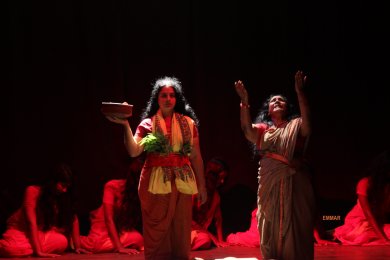
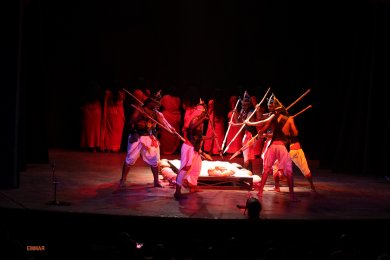
Booming drum beats resound, the curtain rises; submerged in blood-red light the stage reminds you of the afterglow of a burning ghat. Soldiers clad in village dress code with their spears swaying in stylized dance celebrate the victory of war. As they move away, we see the specter of a woman, prostrate as if on a pyre. The captive women and the soldiers form the chorus. The central character is the Queen mother surrounded by the widows in mourning. Evoking Gandhari Vilapam to an Indian mind, the play moves on to narrate the tragedy of her family within the larger context of her country. The cause of war is the abduction of woman, an incident like what caused the Trojan War or the war between Rama and Ravana. And the play deals with the theme of moral degradation from another perspective. The story unravels through folk songs, dialogues and moving tableaux in measured steps. The play does not have a background score. The soundscape is built by the rhythmic movements of dancing steps in sync with drum beats, and spears hammering on the ground, punctuated by silences in between, which create a special effect. Oppari, the ceremonial lament of rural Tamilnadu cascading in folk strains is the signature song. Music fathoming the depth of the ineffable is the salient feature of the play. Performance in stylized dance has an aesthetical appeal like abstract painting or pure music. What is gruesome in realistic representation acquires intensity, like a scalding memory. The props in different contexts gain different meanings. The spear and the earthen pot attain sexual connotations at times. The earthen pots with a painted eye stand for skulls in the battle ground. They are the sacred pots used in ritual ceremonies. They are the breasts of the mother that feed and nurture babies. As water carriers perched on the heads of women who walk long distances, they have carried folk memories of war long before recorded history. 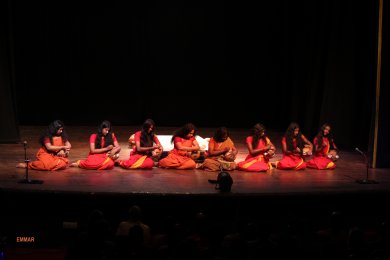 The play starts when the widowed women, captured by the enemy soldiers come to the Queen mother. They ask themselves what next. And with the Queen mother they bewail their fate. That the women are the spoils of war to be enjoyed by the victorious is a fact down human memory. The tableau of a young woman cast as if for the sacrificial altar is led by soldiers. She is the eldest daughter, Princess Thulasi, a saintly woman as her name suggests. The arrogant winner is determined to make her the wife of his son. She has come to ask for the blessings of the Queen mother on her way to the forced rite. In a flashback, the Queen recalls how Nature burst into flowers when her baby was born; how she wanted to lead a hallowed life like the legendary Princess Meera in love with Krishna. Yet human spirit succumbs to calamity. But the Princess is above the common run of weak humans. In divine frenzy she predicts her own death which will suck in the death of the Prince as well. The theme of surrender is reinforced by the primordial ritual of human sacrifice. The second daughter is led by the soldiers as a sacrificial lamb. She needs to be sacrificed for the victorious procession of the conqueror returning home with the spoils of war. The tragic story of Iphigenia in the Greek epic is but a continuum. Now comes the wife of the dead Prince. She is holding her infant boy, the one male left alive in the land. The Queen mother finds hope kindling as she dreams of the baby growing up into a brave man who will one day avenge the wrongs done to them. But his mother gives the Queen a rude shock. That she too has to reconcile to the fate of any other woman of a defeated land. Sexual violence is reiterated with the spears moving in sync with the moving feet producing a different rhythm. Now the baby is in the focus. The soldiers bring the order of the King to kill the baby Prince. Such inhumanity is too much to bear. From the ashes of defeat the Queen Mother rises in her elements. She does not mince her words. She cannot bewail her fate. That human spirit succumbing to calamity is the weakness of the soul. She spits out the bitter truth that killing a baby is not an act of bravery in war but cowardice. Yet, madness heeds not reason. The spears fall on the baby…. The ceremonial lament flows. 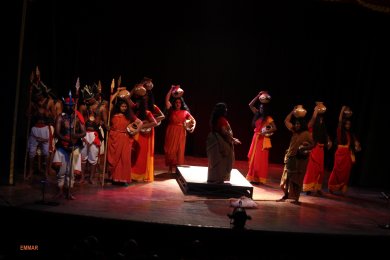
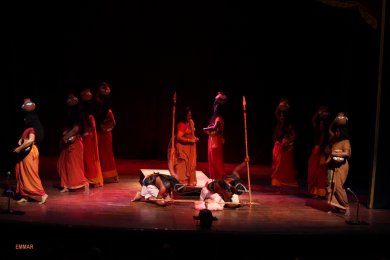
The ritual of burial is different now. The metaphor of the Mother looms large. The women wash the dead body with breast milk. The soldiers try to lift the body of the baby prince, as a gift to the conqueror. As if it were a divine retribution for an unforgivable crime they shudder under its weight. The burden of guilt is so heavy… The song, the prop and the singing style indicate another dimension now. The lament changes into lullabies, lullabies that put the baby Prince to sleep. Soon, the refrain rises in multiples. Lullabies that put the souls of martyrs of war to everlasting peace since time immemorial. Lullabies that countless mothers sing that put the 3-year-old Aylan Kurdi, the victim of ISIS that haunt human conscience, to rest. It is a heart wrenching finale of a poignant drama wrought in pain. Padma Jayaraj is a freelance writer on the arts. She is a regular contributor to www.narthaki.com |